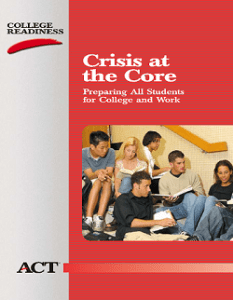Too Many College Freshman Need Remedial Courses
A few months ago I read an article quoting Bob Wise, president of Alliance for Excellent Education, about the very large number of college freshman who need remedial work, and how this often delays graduation and increases costs of higher education.
The article summarized findings from a study by the U.S. Department of Education based on 2012 statistics. Here are some troubling findings:
- One in four college freshman nationwide takes at least one noncredit remedial class
- Costly reading and writing remedial courses delay college graduation and increase by half the likelihood that students will not complete studies
- The nationwide costs of remedial courses was $3.6 in tuition alone in 2007-08
- Freshman at the 14 state-owned universities took 4,584 remedial courses in the 2012-13 school year that cost about $1000 a course
What is the solution to this problem? We need to convince secondary teachers of all subjects that they can and must play an essential role in developing their students’ reading and writing skills at the same time that they teach them content.
Here’s an example of how one science teacher came to accept this challenge. Last year I met Ron, a science teacher, who taught advanced placement science courses at a high school in New Hampshire. During initial training for how to teach comprehension strategies (using The Key Comprehension Routine), Ron was quite vocal about his belief that the high-level students in his AP classes already had good reading and writing skills; he therefore did not believe he should be spending time teaching comprehension strategies. I politely agreed to disagree.
About six months later, I returned to the school for some follow up professional development. To my surprise, Ron greeted me at the start of the day to share an experience he recently had that changed his position. Ron explained that one of his top students who had graduated the previous June and gone off to a prestigious college came to visit during fall break. The student shared that he had to drop out of his freshman science class because he could not keep up with the reading and note taking that was required. The student told Ron that, in high school, the science content was easy to learn because his teachers had “packaged” the material and delivered it using discussion, experiments, and teacher-generated notes. But in college, he was expected to “teach himself” through reading and listening to lectures that were fast-paced with minimal support from the professor. Ron explained that this conversation really affected his thinking, and that he was ready to learn how to teach all of his students how to read and write like a scientist.
 If you are trying to convince content teachers to take on more of a role in improving student literacy skills, perhaps it will help to share the findings I listed above. Another good source on this topic is the report “Crisis at the Core: Preparing All Students for College and Work” prepared by ACT.
If you are trying to convince content teachers to take on more of a role in improving student literacy skills, perhaps it will help to share the findings I listed above. Another good source on this topic is the report “Crisis at the Core: Preparing All Students for College and Work” prepared by ACT.

 Joan Sedita is the founder of Keys to Literacy and author of the Keys to Literacy professional development programs. She is an experienced educator, nationally recognized speaker and teacher trainer. She has worked for over 35 years in the literacy education field and has presented to thousands of teachers and related professionals at schools, colleges, clinics, and professional conferences.
Joan Sedita is the founder of Keys to Literacy and author of the Keys to Literacy professional development programs. She is an experienced educator, nationally recognized speaker and teacher trainer. She has worked for over 35 years in the literacy education field and has presented to thousands of teachers and related professionals at schools, colleges, clinics, and professional conferences.
I am not surprised. As a teacher I witness public schools pushing kids through the system, regardless of whether they are on grade level or not. I suggest grouping students according to ability, not age. How about initiating apprenticeships, so students graduate with a skill? Not all students are inclined on an academic track. Also students can refer to online tutoring websites like Transtutors, Tutorhut, etc.